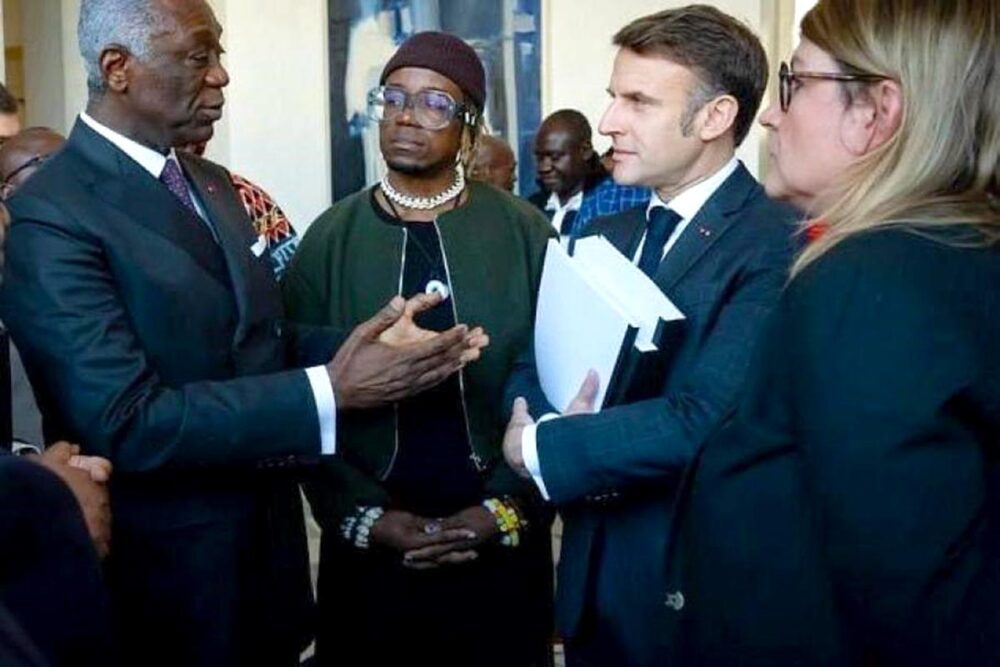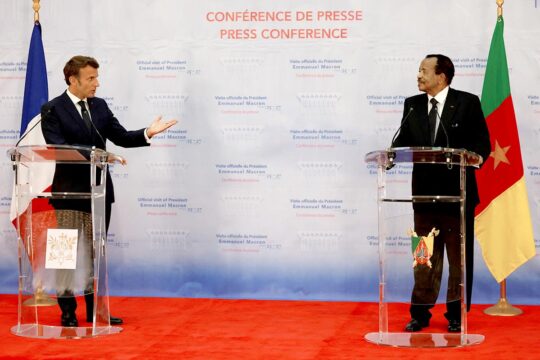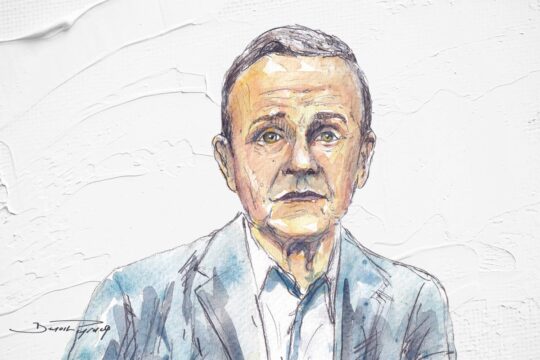“We wanted the two countries, France in particular, to acknowledge their crime against nationalist movements in Cameroon,” says Willibroad Dze Ngwa, a professor of history at the University of Yaoundé and Cameroonian member of the Commission. “We want a situation where the true history of French nationalism in Cameroon is inscribed in books and taught in Cameroonian schools and colleges. In French society, it is generally believed that there was no French war in Cameroon, as people think only about what happened in Algeria.”
In France, successive leaders had rejected the idea that there was ever a French war in Cameroon although former president François Hollande admitted on a visit to Yaoundé in 2015 that there had been “extremely troubled, even tragic episodes”. It was not until 2022 that President Macron called for historians to finally “shed light” on France’s actions in Cameroon before and after independence, promising to open “totally” French archives on “painful” and “tragic” moments of this little known history.
“That is why we were brought together to determine the extent of the war,” says Dze Ngwa. “We are very content with the report because it has brought new statistics, new revelations, new ideas and sources of documentation.”
Macron announced the creation of the commission in July 2022, at a joint press conference with Cameroon’s long-time President Paul Biya, a move seen as part of Macron’s promises to deal with France’s colonial past. The commission was co-chaired by French historian Karine Ramondy and Cameroonian musician Blick Bassy, who dedicated one of his albums, “1958”, to assassinated anti-colonialist leader Ruben Um Nyobè. Bassy was in charge of the cultural aspect of the commission’s work. The “research” commission was composed of seven French and seven Cameroonian historians, of whom five are women and nine men.
The commission was charged with looking into “France’s involvement and engagement in suppressing independence and opposition movements in Cameroon between 1945 and 1971”. Cameroon won independence from France in 1960, but France continued to support repression of opposition movements during the rule of Cameroon’s first post-independence president Ahmadou Ahidjo, who collaborated with the French. Cameroon’s current 92-year-old president for more than 40 years, Paul Biya, was a prime minister under Ahidjo.
“We wanted to write this history”
The officially commissioned historians’ report was submitted to the French and Cameroonian governments at the end of January this year. At some 1,000 pages long, it is probably not something everyone will read from beginning to end. It is based on joint research, extensive documents including thousands newly declassified by France, and testimonies. Summaries are available in French and English, while an English translation of the full report is expected towards the end of the year.
“Our report is a scientific work drawn up by experts with methodology and rigour, and as such it could not be superficial,” the commission’s French co-president Karine Ramondy told Justice Info. “Our duty was to retrace the complexity of the facts, what happened to the men and women involved in these events. We wanted to write this history, not glide over it, and we hope it will be read, even if it is only the 15-page summary.”
Richard Joseph, a professor emeritus of African politics who has written books on Cameroon, says that until now “it has not been possible to conduct open research on the independence struggle in Cameroon, as has been the case in most other African countries”. Therefore, he told Justice Info, “the detailed information in the report on what took place in particular localities and who the actors were is unprecedented”. Joseph was not a member of the commission, but it gave him special thanks for encouraging and exchanging with the commission.
A “total” war
The report provides new detail on massacres, assassinations and attacks on civilians. It acknowledges the acts of violence perpetrated by the French army and soldiers under its command against combatants and civilians as part of a “total” war. It says France had “recourse to the ‘revolutionary war doctrine’, practised in Indochina, continued in Algeria and adapted by the French army in Cameroon in the form of special military zones; ‘counter-revolutionary’ organisation of civilian populations and use of ‘psychological action’ and psychological and physical violence (including attacks on women, civilians and bodies, the use of torture, executions and disappearances); collective violence (bombings and use of incendiary cartridges); destruction of villages, sometimes widespread in certain regions; massacres of civilians, including those documented by the Commission at Ékité on 30-31 December 1956 and Balessing on 28 May 1960; execution of civilians identified as combatants; and forced displacement of civilian populations to ‘regroupment’ camps, causing major long-term damage”.
The report says that given the intense repression inflicted on the ground between 1958 and 1965, the commission reflected on use of the word genocide in terms of its definition then and now. While the commission says it had no “legal competence to qualify these practices as ‘genocidal’,” it also said that “it is undeniable that this violence was extreme, because it violated human rights and the law of war”.
A call for France to recognize its responsibilities
The historians’ report also makes recommendations to both France and Cameroon. To France, it proposes that French President Emmanuel Macron deliver a speech recognizing the role and responsibilities of France in the Cameroon war, qualified as an “anti-colonial war”, including the use of various forms of violence by French forces and Cameroonian forces under French command, as well as its role in helping suppress opposition groups after 1960 under a Cameroonian regime that was becoming increasingly autocratic. France should recognize the bloody events in Douala in 1945 – when colonial forces opened fire to suppress a popular uprising, immediately killing some 80 people and launching a manhunt – and inscribe them in the “repressive sequence conducted by French authorities in its colonial empire after the Second World War (Senegal, Algeria, Madagascar)”.
In addition, France should recognize the “political, diplomatic, police and judicial repression” that French authorities used against the UPC independence movement, the Democratic Union of Cameroonian Women (UDEFEC) and the Cameroonian Democratic Youth (JDC), which “intensified after they were banned in 1955”. It should acknowledge the responsibilities of French authorities and the French army in the assassinations of UPC leaders: Isaac Nyobè Pandjock (1958); Ruben Um Nyobè (1958); Félix-Roland Moumié (1960); Paul Momo (1960); and Jérémie Ndéléné (1960). Finally, the report proposes that France set up “a place of remembrance and commemorative plaques, allowing visibility to be given to this little known war”.
To Cameroon, it proposes that President Biya also make a speech recognizing the Cameroonian war as a “war of de-colonization”, and the “excessive repressive violence” used by the colonial authorities and French army before and after 1960. The report recommends that memorial sites and plaques be set up across Cameroon, particularly at massacre sites, and given value and visibility by the Cameroonian State. Finally, it proposes creation of a national remembrance day for the victims of the country’s anti-colonial war.
Did France use napalm?
The French government website carries a report on the cultural activities of the commission’s “artistic” section led by Cameroonian musician Blick Bassy. But there is also another report by Bassy’s team, as reported by the francophone TV network TV5MONDE, containing a selection of witness testimonies from Cameroon. Although this report was not officially commissioned, Bassy is quoted as saying that “in our team, we also thought we should submit a summary of our work, even if that was not expected of us”. He is also quoted as saying this report was submitted to the French foreign ministry in mid-February.
This report contains one particularly controversial testimony in which Emmanuel Mukam, a witness to French repression in the Cameroonian region of Bamiléké, alleges that the French used napalm, a chemical weapon notoriously used by the US army in Vietnam. Use of napalm against civilians is banned under international law. His testimony was not included in the historians’ report. As reported by TV5MONDE, Mukam was upset about this and wondered why he had testified. He wrote in a Facebook post that he had been handicapped for 65 years, having lost his sense of smell at age 7, and that doctors in France and India had confirmed it was through inhalation of napalm.
“We learned of this testimony after the report was submitted at the end of January and were unable to include it in our study, which we deplore,” said Ramondy when asked about this. “To avoid any wrong accusations, I would like to make it clear that we did not avoid the question of napalm in the report, as some witnesses had already referred to it in Gaelle Leroy and Valerie Osouf's documentary film,” she says.
“On the contrary, in order to cross-check our sources, we searched military archives for any mention of the use of ‘special canisters’, as some historians of the Algerian war have found,” she adds. “Nothing came of this, but we were able to document large deliveries of incendiary cartridges, which were equally devastating, at a time when General Briand was stepping up military crackdowns in the west at the beginning of 1960, in order to wipe out the guerrilla fighters. The use of these cartridges resulted in massive destruction, the burning of huts, casualties. The report evokes all this without concession.”
Controversy in Cameroon
The commission has provoked some controversy in Cameroon, right from when its members were first appointed. Some, notably in academic circles, criticized its composition and competence. Dze Ngwa suggests this might just be professional jealousy, because every researcher in the field “would want to be part of a commission that could make history”.
“Others would say there are things that were not mentioned in the report,” he continues, “such as the napalm you are talking about. Some of the people will say that we did not call on the French to pay reparation, and then we did not call it genocide.” He says some people also complained that the commission did not go to their village, where they said their relatives were killed.
But when the report came out and people took time to read it, many of those who had made the statements started retracting, he says. “They have been able to get the facts and figures, those who read it, and I think they understood that we did not go to the field as lawyers and magistrates to pass judgment. We went to the field as historians to establish facts and figures, so we could not declare that the war in Cameroon was a genocide, because that was not our mission.” He told Justice Info the commission received many messages of congratulation both from inside and outside Cameroon when the report came out.
Dze Ngwa says the commission worked together very well and he is proud of the report, but that “no human endeavour is 100% perfect” and follow-up is needed.
Follow-up and political will
So can we expect follow-up? “We all hope so,” says Ramondy. “But what happens next doesn’t just depend on the French and Cameroonian presidents. We want this work to be promoted and presented in different spheres: in universities, of course, but also in associations, and to non-specialist audiences at meetings and debates. This work frees people to speak out. Many people have contacted us to give their testimony, and we see from the encounters that speech is freed between generations of the same family.”
Joseph says all the commission’s recommendations are important, “but I see the list as preliminary. It should provoke many other suggestions”: “The ‘culture of silence’ among Cameroonians is deep. There is an ingrained reluctance to discuss the brutalities that occurred. Achille Mbembe has called attention to the transmission of memories in ways not perceptible to outsiders. Many wounds are unhealed. Commemorations are often private or communal rather than public.”
He adds that: “The work of the commission was designed to focus on the 1945-1971 period, that is, on less than 15 years of colonial rule and 11 years of post-colonial governance. Researchers, journalists, and others will not confine their inquiries to these timelines.”
Dze Ngwa believes that there is now political will in France and Cameroon to start implementing the report’s proposals, and that there are already signs of this. “The first follow-up would be an international conference because, like we said, our report has only opened the door to future research. That is why we are inviting before long researchers from around the world who have some facts and figures that we did not see and establish in the work. For example, if we have concrete documentation about the use of napalm, then this should be brought to bear in this conference.”
He says the leaders of the two countries are also putting together a follow-up committee. “No clear policies have so far been adopted as a result of the commission’s work,” he says. “The most important thing is not the report, it is the impact of the report on both Cameroon and France. And that cannot happen if there are no policy guidelines adopted by the two countries.”







